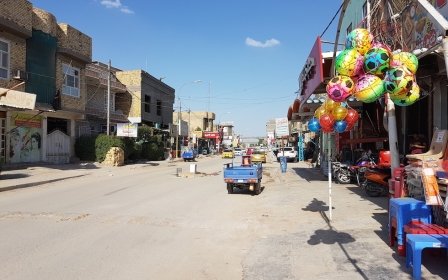Gunmen besiege polling stations in Iraqi city of Kirkuk
Gunmen in the northern Iraqi city of Kirkuk on Wednesday besieged several polling stations with electoral staff still inside, four days after a national vote took place, the head of the electoral commission said.
Riyadh al-Badran said the gunmen, whom he did not identify, were pressuring the commission to change the election results in the multi-ethnic region.
"The employees of the commission are in a hostage situation," he said, calling on authorities to provide protection for them.
On Wednesday evening, however, the head of Kirkuk's law enforcement denied reports that election commission employees were being detained, adding that polling stations were secured and under the protection of counter-terrorism forces.
"The situation inside Kirkuk province is stable and is not a cause for concern," Major General Maan al-Saadi said in a statement from Iraq's national security media centre.
The final nationwide results should be announced in the next two days, Badran said.
The Turkmen and Arab communities of the region, which also has a large Kurdish population, disputed the initial results in Kirkuk.
The election commission said on Tuesday that the results indicated a win for the Patriotic Union of Kurdistan (PUK), an Iraqi Kurdish party.
In October, Iraqi forces backed by Shia militias dislodged Kurdish Peshmerga fighters who had taken control of Kirkuk city in 2014. The Kurdish fighters prevented the city's capture by Islamic State (IS) group militants who had overrun Iraqi army positions in the northern and western parts of the country.
Saturday's elections were the first since the defeat of IS last year by Iraqi forces backed by a US-led coalition, but the turnout fell far short of previous elections with only 44.5 percent of registered voters participating.
Reports indicate that Sairoun Alliance - a coalition of Shia cleric Muqtada al-Sadr and the Iraqi Communist Party - won the national popular vote with more than 1.3 million votes, gaining 54 seats in parliament out of a total of 329.
However, Sairoun is not certain to form the next government; it will have to negotiate a coalition to secure a parliamentary majority.
A Reuters tally of provincial results announced over the past three days shows Sadr's list in the lead, followed by the bloc headed by Shia militia leader Hadi al-Amiri, a close ally of Iran, and then outgoing Prime Minister Haider al-Abadi's list.
Iranian Major General Qassem Soleimani was holding talks with politicians in Baghdad to promote the formation of a new cabinet that would have Iran's approval, two people familiar with the political process said.
Middle East Eye propose une couverture et une analyse indépendantes et incomparables du Moyen-Orient, de l’Afrique du Nord et d’autres régions du monde. Pour en savoir plus sur la reprise de ce contenu et les frais qui s’appliquent, veuillez remplir ce formulaire [en anglais]. Pour en savoir plus sur MEE, cliquez ici [en anglais].




